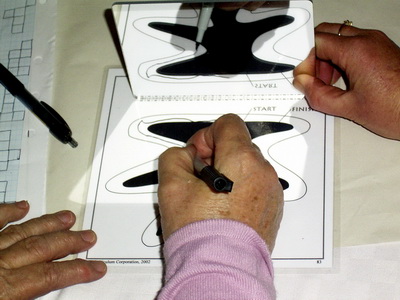Professional Learning Review
Lisa Cairns
Launceston Christian School, Tasmania
Our work is 100% professional learning. At the end of a Task Centre Package workshop the staff were invited to take the Evaluation sheet, ponder their response over night and hand it to their HoD the next day. The questions led Lisa to responding more reflectively and extensively in this Professional Learning Review. Her thoughts tell her story, but highlight several messages for all of us.
Our thanks to Lisa for willingly sharing this and to Robert Armstrong (HoD) for organising the day and its review.

This teacher is trying to trace the track by looking in the mirror.
Where is the maths in that?